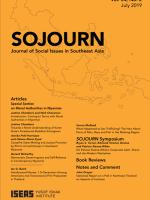Ethnic Armed Organisations in Myanmar are not just rebels but also state-makers
In Myanmar the legacies of military rule and decades of armed conflict means that official state institutions, like the courts and police, are still highly mistrusted and partly absent in many areas. This situation has not implied a vacuum of authority, however. The larger ethnic armed organisations, which have rebelled against the state since the 1940s-50s, have for many years engaged in parallel state-making efforts, which among other state-like institutions, include justice systems. Most of these ethnic armed organisations now have ceasefire agreements with the Myanmar government, but an actual peace agreement that would involve a political settlement is still being negotiated at the national level. In this liminal phase, between ceasefire and a political settlement, contested forms of state-making and governance are taking place in ceasefire areas.
This article written by DIIS senior researcher Helene Maria Kyed and Annika Pohl Harrisson (Aarhus University) engages with current debates about rebel governance and empirical state formation. Based on extensive fieldwork in 2016-2017 in southeast Myanmar, the authors argue that the ethnic armed organizations cannot simply be dismissed as rebels focused on extraction and coercion alone, but are also state-makers who nurture legitimate authority, for instance by delivering justice and security to the civilians they claim to represent.
The article introduces the concept of ‘ceasefire state-making’ to improve understandings of the particular dynamics of state-making in the interim phase between a ceasefire and a political settlement. Kyed and Harrisson argue that ceasefire state-making is characterised by ‘liminality’, understood as a ‘betwixt-and-between’ situation, characterised both by the possibilities for new structures to emerge and by instability and uncertainty about the future outcomes. Empirically the authors show how the ethnic armed organisations have developed quite extensive justice systems that are used and seen as legitimate by the civilian populations that they claim to represent. However, due to the uncertainty of the ceasefire situation, these systems face a range of challenges, and it is necessary for them to be flexible and continuously adjust to the uncertain situation. One core concern is that the systems lack external recognition by the Myanmar state. In the conclusion to the article, Kyed and Harrisson discuss the prospects for recognising the justice systems of the ethnic armed organisations as an important step towards peace and stability in Myanmar.
The article draws on research conducted by the DIIS-coordinated research project, ‘Everyday Justice and Security in the Myanmar Transition’ (EverJust), which is done in partnership with Yangon University, the Enlightened Myanmar Research Foundation, and Aarhus University. It is funded by the Danish Ministry of Foreign Affairs through the development research grant.DIIS Experts



